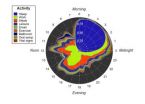(Press-News.org) Life events such as visiting another country or contracting a disease cause a significant shift in the make-up of the gut microbiota – the community of bacteria living in the digestive system, according to research published in the open access journal Genome Biology.
Two participants used smartphone apps to collect information every day for a year in the study by scientists from MIT and Harvard. The authors think the method could be rolled out to studies of human-bacteria relationships with many more participants.
Our microbiota is the community of bacteria that share space with our bodies, and is individual to each person. The bacteria live in harmony with us, but it is thought that the composition of our microbiota has a close relationship to our health.
After a screening process, scientists asked two volunteers to use a smartphone app to log their daily activity, including their diet, exercise, bowel movements and mood and submit regular stool and saliva samples. The participants were screened before the experiment for their willingness to track such a broad range of daily actions. The two participants then logged their activity for a year, and the data from the diaries and genetic analysis of the bacteria in the samples were analysed in detail, to see what had the greatest effect on the composition of the microbiota.
The results showed that the participants had a 'default' microbiota, which were unaffected by sleep levels, exercise and mood. What did have a significant effect on the microbiota were two life events – one subject moved abroad, while the other had a significant bout of food poisoning which caused most pre-existing gut bacterial species to decline. The effects of relationships between diet and specific groups of bacteria manifested in a single day.
Professor Lawrence David from Duke University said: "I was surprised by our results in several ways. First, I wasn't sure we would find correlations between fiber intake and gut bacterial dynamics on such short time scales. And I was amazed to see how profoundly a single food poisoning event impacted the gut bacteria. This has given us a lot of new ideas for follow up studies and analyses of gut microbial ecology, as well as enteric infectious diseases in humans."
INFORMATION:
Smartphone experiment tracks whether our life story is written in our gut bacteria
2014-07-25
ELSE PRESS RELEASES FROM THIS DATE:
Leaf-mining insects destroyed with the dinosaurs, others quickly appeared
2014-07-25
After the asteroid impact at the end of the Cretaceous period that triggered the dinosaurs' extinction and ushered in the Paleocene, leaf-mining insects in the western United States completely disappeared. Only a million years later, at Mexican Hat, in southeastern Montana, fossil leaves show diverse leaf-mining traces from new insects that were not present during the Cretaceous, according to paleontologists.
"Our results indicate both that leaf-mining diversity at Mexican Hat is even higher than previously recognized, and equally importantly, that none of the Mexican ...
Monitoring the rise and fall of the microbiome
2014-07-25
CAMBRIDGE, MA -- Trillions of bacteria live in each person's digestive tract. Scientists believe that some of these bacteria help digest food and stave off harmful infections, but their role in human health is not well understood.
To help shed light on the role of these bacteria, a team of researchers led by MIT associate professor Eric Alm recently tracked fluctuations in the bacterial populations of two research subjects over a full year. The findings, described in the July 25 issue of the journal Genome Biology, suggest that while these populations are fairly stable, ...
Atomic structure of key muscle component revealed in Penn study
2014-07-25
VIDEO:
This is a representation of the atomic structure of tropomodulin at the minus end of the actin filament in muscle sarcomeres. Tropomodulin interacts with the first three actin subunits of...
Click here for more information.
PHILADELPHIA - Actin is the most abundant protein in the body, and when you look more closely at its fundamental role in life, it's easy to see why. It is the basis of most movement in the body, and all cells and components within them have the capacity ...
Increased risk for head, neck cancers in patients with diabetes
2014-07-25
Diabetes mellitus (DM) appears to increase the risk for head and neck cancer (HNC). Evidence suggests certain cancers are more common in people with DM, but the risk of HNC in patients with DM has not been well explored. Overall, head and neck cancer is the sixth most common type of cancer. It accounts for about 6 percent of all cases and for an estimated 650,000 new cancer cases and 350,000 cancer deaths worldwide each year.
The authors used Taiwan's Longitudinal Health Insurance Research Database to examine the risk of HNC in patients with DM. The authors compared 89,089 ...
8.2 percent of our DNA is 'functional'
2014-07-25
Only 8.2% of human DNA is likely to be doing something important – is 'functional' – say Oxford University researchers.
This figure is very different from one given in 2012, when some scientists involved in the ENCODE (Encyclopedia of DNA Elements) project stated that 80% of our genome has some biochemical function.
That claim has been controversial, with many in the field arguing that the biochemical definition of 'function' was too broad – that just because an activity on DNA occurs, it does not necessarily have a consequence; for functionality you need to demonstrate ...
Invertebrate numbers nearly halve as human population doubles
2014-07-25
Invertebrate numbers have decreased by 45% on average over a 35 year period in which the human population doubled, reports a study on the impact of humans on declining animal numbers. This decline matters because of the enormous benefits invertebrates such as insects, spiders, crustaceans, slugs and worms bring to our day-to-day lives, including pollination and pest control for crops, decomposition for nutrient cycling, water filtration and human health.
The study, published in Science and led by UCL, Stanford and UCSB, focused on the demise of invertebrates in particular, ...
Farmers market vouchers may boost produce consumption in low-income families
2014-07-25
Vouchers to buy fresh fruits and vegetables at farmers markets increase the amount of produce in the diets of some families on food assistance, according to research led by NYU's Steinhardt School of Culture, Education, and Human Development.
The study, which appears online in Food Policy, suggests that farmers market vouchers can be useful tools in improving access to healthy food. This finding validates a new program created by the Agricultural Act of 2014, or farm bill, that incentivizes low-income families to buy produce at farmers markets.
"In terms of healthy ...
Researchers discover new way to determine cancer risk of chemicals
2014-07-25
BOSTON -- A new study has shown that it is possible to predict long-term cancer risk from a chemical exposure by measuring the short-term effects of that same exposure. The findings, which currently appear in the journal PLOS ONE, will make it possible to develop simpler and cheaper tests to screen chemicals for their potential cancer causing risk.
Despite an overall decrease in incidence of and mortality from cancer, about 40 percent of Americans will be diagnosed with the disease in their lifetime, and around 20 percent will die of it. Currently fewer than two percent ...
Less than 1 percent of UK public research funding spent on antibiotic research in past 5 years
2014-07-25
Less than 1% of research funding awarded by public and charitable bodies to UK researchers in 2008 was awarded for research on antibiotics, according to new research published in The Lancet Infectious Diseases.
The study, which is the first detailed assessment of public and charitable funding to UK researchers focusing on bacteriology and antibiotic research, suggests that present levels of funding for antibiotic research in the UK are inadequate, and will need to be urgently increased if the growing crisis of antibiotic resistance is to be tackled effectively by UK ...
Synchronization of North Atlantic, North Pacific preceded abrupt warming, end of ice age
2014-07-25
CORVALLIS, Ore. -- Scientists have long been concerned that global warming may push Earth's climate system across a "tipping point," where rapid melting of ice and further warming may become irreversible -- a hotly debated scenario with an unclear picture of what this point of no return may look like.
A newly published study by researchers at Oregon State University probed the geologic past to understand mechanisms of abrupt climate change. The study pinpoints the emergence of synchronized climate variability in the North Pacific Ocean and the North Atlantic Ocean a few ...



